The Super Foods Factor
The Super Foods Factor........Foods that Boost the Immune System.......Foods that Prevent Cancer ........Foods that Prevent Heart Disease.......Foods that Prevent Aging .....Foods that Prevent Inflammation .....
Imagine a super food -- not a drug -- powerful enough to help you lower your cholesterol, reduce your risk of heart disease and cancer, help you lose weight, and, for an added bonus, they slow down aging and put you in a better mood. Did we mention that there are no side effects? You'd surely stock up on a lifetime supply. Guess what? These life-altering super foods are available right now in your local supermarket. All you have to do now is educate yourself on what they are and what they do to make a better you.
My Morning Breakfast - Yum!
Breakfast will never be boring again. Watch with drooling awe as I prepare the most delicious, nutritious breakfast you have ever seen! This breakfast packs a walloping supply of your daily proteins, healthy fats (omega 3s and 6s), vitamins, minerals, antioxidants, probiotics and fiber. Once you taste my ultimate breakfast, there's no going back to Cheerios or cheesy egg omelets. I guarantee it!
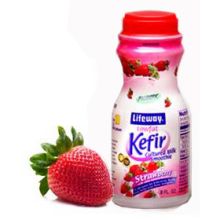
|
|
The Importance of Probiotics- The Beneficial Bacteria
Kefir, Yogurt,and Probiotics-Beneficial bacteria — such as Lactobacillus bulgaricus , L. thermophilus, Acidophilus, Bifidobacterium which are used in fermenting yogurt, as well as in the manufacture of B vitamins and vitamin K. In addition to providing the gut with healthy symbiotic microflora, many studies have also demonstrated the anti-fungal and antibacterial properties of kefir. Certain bacteria strains from the kefir culture have been shown to help in treating colitis by regulating the inflammatory response of the intestinal cells. Besides containing highly beneficial bacteria and yeasts, kefir is a rich source of many different vitamins, minerals and essential amino acids that promote healing and repair, as well as general health and maintenance of the entire digestive system. It has also been demonstrated to improve lactose digestion in adults with lactose intolerance.
What is an antioxidant and what does an antioxidant do?
Watch one of the best videos ever produced by Dr. Oz that explains how foods high in antioxidants help prevent cancer, aging and other age related diseases.
Essential Oils for Sleep
I love essential oils. Changed me and my kids life. We haven't been seriously sick since using them. My sons seasonal allergies gone using lavender. Even his allergic asthma coughs go away once I apply lavender to his neck. The episodes have also become less and less. From like once a month to once every six months and only last an hour versus two days.
The AMAZING Benefits Of Dark Chocolate!
Eating dark chocolate can result in some incredible health benefits! What are they? This new video discusses why we should all be eating dark chocolate!
The Acai Berry
The Acai berry contains a remarkable concentration of antioxidants that help combat premature aging, with 10 times more antioxidants than red grapes and 10 to 30 times the antioxidant power of pomegranates and blueberries. The fatty acid content in açaí resembles that of olive oil, and is rich in monounsaturated oleic acid. Oleic acid is important for a number of reasons. It helps omega-3 fish oils penetrate the cell membrane; together they help make cell membranes more supple. By keeping the cell membrane supple, all hormones, neurotransmitter and insulin receptors function more efficiently. This is particularly important because high insulin levels create an inflammatory state, and we know, inflammation causes aging. Read more: https://www.oprah.com/health/Acai-Dr-Perricones-No-1-Superfood#ixzz2Mn5Y8wJP
The Juice Woman
Jesus said in John 10:10 - "I have come to give you life and life more abundant" - but more and more Christians are getting sick today and dying young at an alarming rate. Jesus died for all of our pain, died for all of our diseases! So how come there are as many sick Christians as non-Christians? Cherie Calbom, known as the Juice Woman, shares how to eat the good and delicious food God has provided for us so we can become the "Healthiest People On Earth!"
The Vital Importance of the Omega 3 Fatty Acid, DHA for Children's Brain Development!
This video discusses the importance of DHA, which makes up 60% of our brain and eyes.
Foods that offer good fats in our diets!
Are there such things as 'good fats'? Most people have the misconception that fats in our diets are bad for us. This video will explain the importance of fats in our diets and what types of fats we should be eating daily. Foods that all offer good fats - click this link - https://www.myhealthnewsdaily.com/758-best-foods-brain-health.html
The vital role amino acids play in keeping us healthy!
Most people do not understand the relationship between proteins and amino acids, the essential building blocks of our bodies. Fewer yet are unaware that amino acids and proteins are also found in high amounts in certain plants. This informative video explains the vital role amino acids play in keeping us healthy.
10 Vegetables Highest in Iron
Vegans need an ample supply of iron in their daily diet to prevent anemia. This short video shows the top ten vegetables highest in iron.
10 foods that will help you sleep!
Trouble falling asleep and staying asleep? This informative video shows you 10 foods proven to give you a peaceful and restful night's sleep.
The Health Benefits of Gluten-free Foods
Celiac disease is a condition that damages the lining of the small intestine and prevents it from absorbing parts of food that are important for staying healthy. The damage is due to a reaction to eating gluten, which is found in wheat, barley, rye, and possibly oats. This short video shows how easy it is to eat gluten-free foods.
The Health Benefits of Beets
Beets are high in potassium, magnesium, fiber, phosphorus, iron; vitamins A, B & C; beta-carotene, beta-cyanine; folic acid. They are a wonderful tonic for the liver, works as a purifier for the blood, and can prevent various forms of cancer. Beets contain betaine, the same substance that is used in certain treatments of depression. It also contains trytophan, which relaxes the mind and creates a sense of well-being, similar to chocolate. Beets can also lower your blood pressure and neutraize stomach acid. Beets are nature’s Viagra. They contain high amounts of boron, which is directly related to the production of human sex hormones.
The Health Benefits of Ginger and Turmeric
Dr. Weil shows have adding ginger and turmeric to your diet can greatly decrease inflammation in the body caused by arthritis. Turmeric is also being used to reverse the effects of alzheimers and cancer.
The Health Benefits of Bananas
There are many health benefits of bananas that benefit the body in different ways for both men and women. The best thing about bananas, of course, is the amount of Potassium contained in a single banana. However, there are other notable banana health benefits that you may not know about.
Medicinal Uses of the Olive Leaf
Dr. Becker lists important medicinal uses of the olive leaf.
The Importance of Iodine in Your Diet
Research has shown that a lack of dietary iodine may lead to enlargement of the thyroid gland, lethargy, fatigue, weakness of the immune system, slow metabolism, autism, weight gain and possibly even mental states such as anxiety and depression. The good news is that there are many popular foods with iodine, all of which are easy to incorporate into your daily diet.
13 Health Benefits of Cucumber You Must Know
Cucumbers are the fourth most cultivated vegetable in the world and known to be one of the best foods for your body's overall health. They are frequently referred to as a superfood. Cucumbers are often sprayed with pesticides so it is important to buy organic or even better, grow them yourself.
The surprising health benefits of caffeine
Britons are now estimated to drink 2.1 billion coffees and 874 million cups of tea outside their homes – and the good news is that our hefty caffeine has some helpful health benefits. According to new research from Stanford University, a daily dose of caffeine prevents inflammation in blood vessels, which lowers the risk of heart disease. Here are some newly discovered health benefits of consuming caffeine.
1. It might make you smarter – in the short and long term
Caffeine gives you a mental boost for 45 minutes, according to an Austrian study – which is handy to know whenever you're flagging at work. Research from John Hopkins University also found that caffeine can enhance memories up to 24 hours after is it consumed. Participants in the study were were given two different sets of images over two days and those who had consumed coffee were better able to differentiate the visuals than those who were caffeine-free.
2. It could reduce your risk of Parkinson’s
Even after that burst of mental stimulation, you should probably keep on drinking, according to Harvard researchers. Research pulled together in 2015 showed that drinking four or five cups of coffee a day cut the risk of Parkinson’s disease in half. Caffeine might also be good for people who already suffer from Parkinson's. A 2012 study suggested that caffeine can help with common symptoms, such as problems with co-ordination.
3. It’s fuel for your workout
A recent Spanish study showed that athletes burned 15 per cent more calories for three hours after exercise than those who were given a placebo. More good news from scientists at the University of Illinois: drinking two to three cups’ worth of caffeine an hour before a workout could reduce perceived muscle pain.
4. It could lower your risk of diabetes
If you increase your daily coffee consumption, you could lower lower your risk of type 2 diabetes. A 2014 Harvard study showed that people who increased their coffee intake over a four year period had 11 per cent lower risk of the disease than those who didn’t increase their coffee consumption.
- 20 High Fiber Foods - Click This Link
- - https://www.health.com/health/gallery/0,,20553010,00.html?xid=yhlh
- Super foods that fight colds. Click This Link - https://health.yahoo.net/articles/healthcare/photos/superfoods-fight-colds#0
- Foods that Prevent Cancer - Click This Link
- -http://www.caring.com/articles/foods-that-prevent-cancer?utm_medium=partner&utm_source=yahoo
The Recipe for Preventing A Stroke: 1 Coffee, 4 Green Teas a Day
ByLylah M. Alphonse, Senior Editor, Yahoo! Shine | Healthy Living – Fri, Mar 15, 2013 2:03 PM EDT

Researchers have been touting the antioxidant properties of green tea for years, and recent studies show that your daily coffee fix boosts more than just your energy levels. But putting the two drinks together—not in the same cup, of course—may help you reap the health benefits of both.
Researchers looked at the coffee and tea consumption habits of almost 82,369 Japanese adults over 13 years and found that people who had a cup of coffee every day were 20 percent less likely to have a stroke (compared to those who didn't drink coffee at all). But that's not to say that coffee is better for you than tea. In fact, the study noted that people who drank four or more cups of green tea a day were also about 20 percent less likely to have a stroke. Since the two drinks help prevent strokes in different ways, drinking both can lower your risk of stroke more than just drinking one or the other, the study authors explained.
"This is the first large-scale study to examine the combined effects of both green tea and coffee on stroke risks," the study's lead author, Dr. Yoshihiro Kokubo of Japan's National Cerebral and Cardiovascular Center, said in a statement. "You may make a small but positive lifestyle change to help lower the risk of stroke by adding daily green tea to your diet."
The study was published this week in the American Heart Association's journal, Stroke. The results took into account differences in participants' age, gender, smoking, alcohol, weight, diet, and exercise habits.
More Super Foods
There are many superfoods that never see the inside of a shopping cart. Some you've never heard of, and others you've simply forgotten about. That's why we've rounded up the best of the bunch. Make a place for them on your table and you'll instantly upgrade your health - without a prescription.
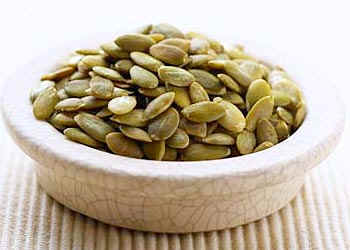
Pumpkin Seeds
These jack-o'-lantern waste products are the most nutritious part of the pumpkin.
Why they're healthy. Downing pumpkin seeds is the easiest way to consume more magnesium. That's important because French researchers recently determined that men with the highest levels of magnesium in their blood have a 40 percent lower risk of early death than those with the lowest levels. And on average, men consume 353 mg of the mineral daily, well under the 420 mg minimum recommended by the USDA.
How to eat them: Whole, shells and all. (The shells provide extra fiber.) Roasted pumpkin seeds contain 150 mg of magnesium per ounce; add them to your regular diet and you'll easily hit your daily target of 420 mg. Look for them in the snack or health-food section of your grocery store, next to the peanuts, almonds, and sunflower seeds.

Cabbage
Absent from most American kitchens, this cruciferous vegetable is a major player in European and Asian diets.
Why it's healthy: One cup of chopped cabbage has just 22 calories, and it's loaded with valuable nutrients. At the top of the list is sulforaphane, a chemical that increases your body's production of enzymes that disarm cell-damaging free radicals and reduce your risk of cancer. In fact, Stanford University scientists determined that sulforaphane boosts your levels of these cancer-fighting enzymes higher than any other plant chemical.
How to eat it: Put cabbage on your burgers to add a satisfying crunch. Or, for an even better sandwich topping or side salad, try an Asian-style slaw.
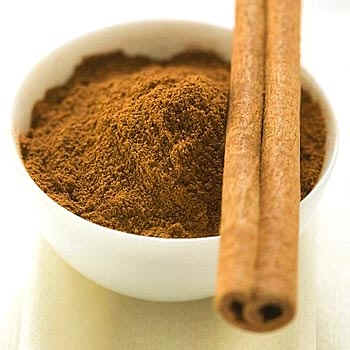
Cinnamon
This old-world spice usually reaches most men's stomachs only when it's mixed with sugar and stuck to a roll.
Why it's healthy: Cinnamon helps control your blood sugar, which influences your risk of heart disease. In fact, USDA researchers found that people with type-2 diabetes who consumed 1 g of cinnamon a day for 6 weeks (about 1/4 teaspoon each day) significantly reduced not only their blood sugar but also their triglycerides and LDL (bad) cholesterol. Credit the spice's active ingredients, methylhydroxychalcone polymers, which increase your cells' ability to metabolize sugar by up to 20 times.
How to eat it: You don't need the fancy oils and extracts sold at vitamin stores; just sprinkle the stuff that's in your spice rack (or in the shaker at Starbucks) into your coffee or on your oatmeal.
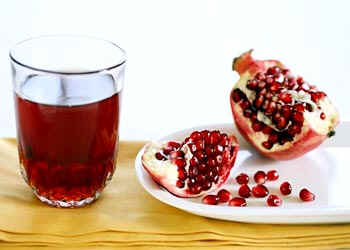
Pomegranate juice
A popular drink for decades in the Middle East, pomegranate juice has become widely available only recently in the United States.
Why it's healthy: Israeli scientists discovered that men who downed just 2 ounces of pomegranate juice daily for a year decreased their systolic (top number) blood pressure by 21 percent and significantly improved bloodflow to their hearts. What's more, 4 ounces provides 50 percent of your daily vitamin C needs.
How to drink it: Try 100 percent pomegranate juice from Pom Wonderful. It contains no added sugars, and because it's so powerful, a small glassful is all you need. (For a list of retailers, go to www.pomwonderful.com.)
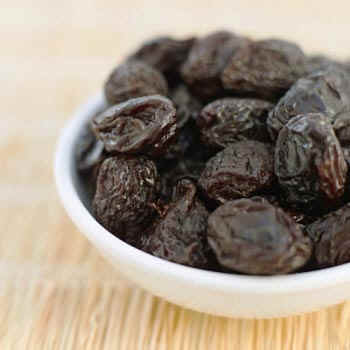
Prunes
You may know these better by the moniker "prunes," which are indelibly linked with nursing homes and bathroom habits. And that explains why, in an effort to revive this delicious fruit's image, producers now market them under another name.
Why they're healthy: Prunes contain high amounts of neochlorogenic and chlorogenic acids, antioxidants that are particularly effective at combating the "superoxide anion radical." This nasty free radical causes structural damage to your cells, and such damage is thought to be one of the primary causes of cancer.
How to eat them: As an appetizer. Wrap a paper-thin slice of prosciutto around each dried plum and secure with a toothpick. Bake in a 400°F oven for 10 to 15 minutes, until the plums are soft and the prosciutto is crispy. Most of the fat will cook off, and you'll be left with a decadent-tasting treat that's sweet, savory, and healthy.
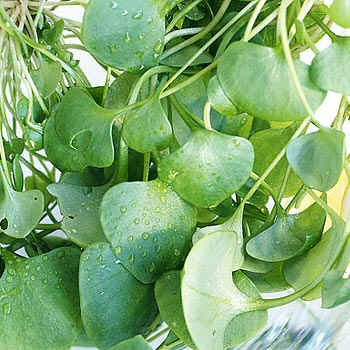
Purslane
Although the FDA classifies purslane as a broad-leaved weed, it's a popular vegetable and herb in many other countries, including China, Mexico, and Greece.
Why it's healthy: Purslane has the highest amount of heart-healthy omega-3 fats of any edible plant, according to researchers at the University of Texas at San Antonio. The scientists also report that this herb has 10 to 20 times more melatonin - an antioxidant that may inhibit cancer growth - than any other fruit or vegetable tested.
How to eat it: In a salad. Think of purslane as a great alternative or addition to lettuce: The leaves and stems are crisp, chewy, and succulent, and they have a mild lemony taste. Look for it at your local farmer's market, or Chinese or Mexican market. It's also available at some Whole Foods stores, as an individual leafy green or in pre-made salad mixes.
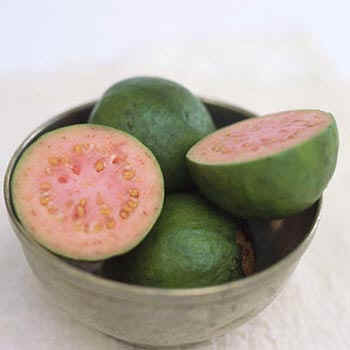
Guava
Guava is an obscure tropical fruit that's subtly acidic, with sweetness that intensifies as you eat your way to the center.
Why it's healthy: Guava has a higher concentration of lycopene—an antioxidant that fights prostate cancer—than any other plant food, including tomatoes and watermelon. In addition, 1 cup of the stuff provides 688 milligrams (mg) of potassium, which is 63 percent more than you'll find in a medium banana. And guava may be the ultimate high-fiber food: There's almost 9 grams (g) of fiber in every cup.
How to eat it: Down the entire fruit, from the rind to the seeds. It's all edible—and nutritious. The rind alone has more vitamin C than you'd find in the flesh of an orange. You can score guava in the produce section of higher-end supermarkets or in Latin grocery stores.
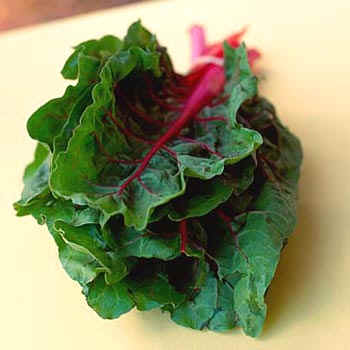
Chard
Hidden in the leafy-greens cooler of your market, you'll find this slightly bitter, salty vegetable, which is actually native to the Mediterranean.
Why it's healthy: A half cup of cooked Swiss chard provides a huge amount of both lutein and zeaxanthin, supplying 10 mg each. These plant chemicals, known as carotenoids, protect your retinas from the damage of aging, according to Harvard researchers. That's because both nutrients, which are actually pigments, appear to accumulate in your retinas, where they absorb the type of shortwave light rays that can damage your eyes. So the more lutein and zeaxanthin you eat, the better your internal eye protection will be.
How to eat it: Chard goes great with grilled steaks and chicken, and it also works well as a bed for pan-seared fish. Wash and dry a bunch of Swiss chard, and then chop the leaves and stems into 1-inch pieces. Heat a tablespoon of olive oil in a large sauté pan or wok, and add two garlic cloves that you've peeled and lightly crushed. When the oil smokes lightly, add the chard. Sauté for 5 to 7 minutes, until the leaves wilt and the stems are tender. Remove the garlic cloves and season the chard with salt and pepper.

Asparagus
- It’s loaded with nutrients: Asparagus is a very good source of fiber, folate, vitamins A, C, E and K, as well as chromium, a trace mineral that enhances the ability of insulin to transport glucose from the bloodstream into cells.
- This herbaceous plant—along with avocado, kale and Brussels sprouts—is a particularly rich source of glutathione, a detoxifying compound that helps break down carcinogens and other harmful compounds like free radicals. This is why eating asparagus may help protect against and fight certain forms of cancer, such as bone, breast, colon, larynx and lung cancers.
- Asparagus is packed with antioxidants, ranking among the top fruits and vegetables for its ability to
neutralize cell-damaging free radicals. This, according to preliminary research, may help slow the aging
process.
- Another anti-aging property of this delicious spring veggie is that it may help our brains fight cognitive decline. Like leafy greens, asparagus delivers folate, which works with vitamin B12—found in fish, poultry, meat and dairy—to help prevent cognitive impairment. In a study from Tufts University, older adults with healthy levels of folate and B12 performed better on a test of response speed and mental flexibility. (If you’re 50-plus, be sure you’re getting enough B12: your ability to absorb it decreases with age.)
- One more benefit of asparagus: It contains high levels of the amino acid asparagine, which serves as a natural diuretic, and increased urination not only releases fluid but helps rid the body of excess salts. This is especially beneficial for people who suffer from edema (an accumulation of fluids in the body's tissues) and those who have high blood pressure or other heart-related diseases
by David Feder, RD
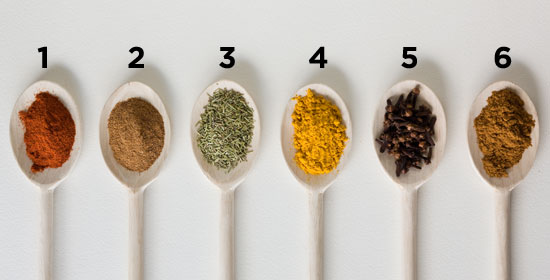
The spice rack may just replace the medicine cabinet in the anti-cancer fight, judging from research suggesting that spices and herbs help reduce cancer risk and slow tumor cell growth. Here's a pinch of info on the most powerful, and a delicious way to enjoy them.
Capsaicin, the active chemical in cayenne pepper, has long been known to help reduce ulcer symptoms, and may have a related ability to lower your risk of stomach cancer.
Nutmeg
In a 2007 study, extracts of nutmeg were able to help cause a type of leukemia cells to self-destruct.
Rosemary
Rosemary's anti-inflammatory properties are proving to be promising against colon cancer.
Turmeric
This key ingredient in curries has been shown to inhibit the development of cancers of the breast, cervix and uterus. Also, a new study suggests turmeric could help keep colorectal cancer cells from spreading.
Cloves
Cloves contain substances that, when eaten, displayed protection against a type of skin tumor in recent studies.
Cinnamon
Compounds in cinnamon called polyphenols may help prevent cell damage that increases cancer risk. Plus, cinnamon has shown an ability to stop the growth of melanoma cells.
9 Turmeric Benefits You Need to Know: The Power of Kitchen Gold (Plus Recipes!)
If you’ve only ever used turmeric as an occasional curry spice, your life’s about to change. Even alone, bright yellow turmeric has a complex, buttery, peppery aroma that’s simply irresistible. And what’s more, there are nearly innumerable health benefits of turmeric to take advantage of when you add this spice to your diet. Turmeric benefits make this deeply-hued spice as valuable as gold in the kitchen; we’ll show you how to use it.
While you’ll often find turmeric on spice racks in powder form, turmeric is actually a member of the ginger family. When purchased fresh, in root form, it resembles ginger, with its nobby beige skin; the golden flesh is hidden until you cut into it.
The nutritional profile of turmeric is vast, according to neuropathic doctor Gabrielle Francis. “It is a potent antioxidant and has bioflavonoids, vitamin c, vitamin a, and beta carotene and can be protective against cancer cells,” she says.
Just take a look at these stats for a mere teaspoon (2 grams) of turmeric:
•.2 mg manganese (8% DV)
•.8 mg
iron (5% DV)
•.5 mg vitamin C (1% DV)
•3.9 mg magnesium (1% DV)
•5.4 mg phosphorous (1% DV)
•50.5 mg
potassium (1% DV)
•.1 mg zinc (1% DV)
Thanks to these nutrients, and more, the benefits of turmeric are wow-worthy.
Top 9 Health Benefits of Turmeric
Turmeric contains a unique compound known as curcumin, which is not only the source of its bright color but is also the secret behind many of the health benefits of turmeric. Curcumin doesn’t only lend variety to turmeric benefits, however; it also boasts proven effectiveness, often more so than pharmacological drugs, as this report shows.
Here are just some of the many ways that turmeric can help you today.
1. Calm Down – Systemically
Systemic inflammation is a huge problem, the source of many health issues that are often incorrectly treated as idiopathic.
As Goldstein explains, “We may think of inflammation when an area becomes red, hot, swollen, and painful. It is a classic response to injury or infection, a very useful process when we break a bone for example, and it needs to be held in place and healed.
“However, chronic inflammation does not really have any ‘outward’ symptoms, but is a general term when even silent processes are occurring that are putting a stress on the body.”
These “silent processes” are behind many health problems, including heart disease, blood sugar issues, cancer, irregular menses, poor sleep and digestion, and more.
“Currently, many people are walking around with multiple diagnoses, in a suburban or urban environment surrounded by fumes, stressed out, not sleeping, and not eating an healthful diet, all of which promotes continuous inflammation and stress on the body,” says Goldstein.
Luckily, turmeric is a very natural way to combat these problems, thanks to its ability to inhibit NF kappa Beta, a protein complex that controls the transcription of DNA and, when incorrectly regulated, has been linked to cancer, auto-immune diseases, and susceptibility to viral infection, many of which are problems that are directly linked to systemic inflammation.
“Unresolved chronic inflammation creates an environment for certain disease processes,” explains Michelle Smekens, ND, FABNO, naturopathic oncology provider at Cancer Treatment Centers of America at Midwestern Regional Medical Center. “Turmeric helps to inhibit the chemical messengers that promote inflammation in the body (…) including cyclooxygenase-2 (COX-2), leukotrienes and prostaglandins.”
The power of turmeric to combat systemic inflammation is astounding. “Numerous studies have demonstrated anti-inflammatory effects comparable to over-the-counter ibuprofen, as well as potent drugs like hydrocortisone,” says Goldstein.
2. Forget Me Not
Turmeric has been linked to helping people with debilitative Alzheimer’s disease stop or even reverse their symptoms. According to a 2008 paper published in the annals of Indian Academy of Neurology, the spice’s antioxidant, anti-inflammatory and lipophilic qualities can and have improved cognitive functions in Alzheimer’s patients.
Goldstein says that turmeric’s benefits include improving the health of brain mitochondria and helping with spatial memory by decreasing lipid per oxidation in brain tissue. These attributes of turmeric have an effect not only on the development of Alzheimer’s but also Parkinson’s and epilepsy.
Additional — albeit circumstantial — evidence can be gleaned from the fact that in India, where turmeric is most commonly consumed, populations have the lowest prevalence of Alzheimer’s in the world. A mere gram of turmeric daily is all it takes in some cases for symptoms to be reversed.
3. Tummy Troubles Gone
Turmeric is particularly soothing when it comes to stomach problems, ranging from mere digestive discomfort to more serious conditions.
Thanks to curcumin’s ability to stimulate the gallbladder to produce bile and its natural ability to suppress stomach acid, it can be used to treat a number of problems including indigestion, bloating, gas, and even ulcerative colitis. This chronic disease’s symptoms tend to come and go, but turmeric manages to keep them at bay in many cases, as one double-blind placebo-controlled study showed: those who took curcumin for 6 months had a significantly lower relapse rate than those taking the placebo.
The same is true for some cases of Crohn’s disease. However, those suffering from stomach ulcers will not see improvement and may even see their symptoms get worse when supplementing with turmeric.
4. No More Pain
Turmeric’s pain relieving abilities are linked in large part to its anti-inflammatory properties; in reducing inflammation, particularly in chronic cases, pain is reduced as well.
Turmeric has been proven to be a very effective pain reliever even in the most drastic of cases, like one 2009 case observed by Dr. Scott Haig, where a patient with severe hip problems necessitating hip replacement surgery eschewed traditional pain relievers entirely and managed his pain with turmeric.
Perhaps the best part: turmeric has none of the nasty side effects of other pain relievers.
“Turmeric has been shown to be as effective as ibuprofen in reducing joint pain caused by arthritis, and does not carry the potential to harm the liver,” says Lori Kenyon Farley, the co-author of The Juice Cleanse Reset Diet Book and cofounder of Project Juice. “In fact, its enzymes have been shown to help detoxify the liver and enhancing blood circulation.”
Turmeric can thus be used for a variety of pain relieving needs, from menstrual cramps to joint pain to arthritis. One 2012 study showed that patients with active rheumatoid arthritis showed a high percentage of improvement when taking curcumin supplements.
5. Cancer Preventative
Supplementing with turmeric has proven to have anti-cancer properties; in fact, cancer is one of the conditions with the most evidence for the benefits of the spice, according to Smekens.
Some evidence of turmeric’s anti-cancer properties includes a 2008 study, showing that curcumin could interfere with cell cycle, apoptosis, angiogenesis, metastasis, and inflammation, all of which could delay or impede a wide variety of cancers from developing, including leukemia, lymphoma, gastrointestinal cancers, breast cancer, ovarian cancer, lung cancer, and melanoma.
A 2009 study showed how curcumin could selectively kill tumor cells without having any adverse effects on normal cells, and several studies, including a 2011 study from the University of Illinois at Chicago, showed that curcumin could have positive effects specifically in the prevention and early treatment of colon cancer.
6. Sugar-Free’s the Way to Be
Several studies have shown that supplementing with curcumin can help manage irregular blood sugar levels, particularly with regards to diabetes; it has even been shown to reverse insulin resistance in certain cases.
One 2014 study on rabbits showed the protective effects of curcumin before diabetes occurred and its ability to treat some symptoms of diabetes, specifically type 1 diabetes. Another 2014 study showed that curcumin could ward against the development of atherosclerosis in type 2 diabetes patients.
7. Heart-Healthy
Curcumin also boasts extraordinary benefits for heart health, including an ability to lower cholesterol and prevent the oxidation of cholesterol in the body, preventing cholesterol from damaging blood vessels. A 2010 study in Nutrition Research and Practice showed that curcumin could decrease LDL and total cholesterol when consuming a high-fat diet, thus reducing risk for heart disease.
Curcumin also prevents the formation of blood clots, reducing the risk of thrombosis and stroke, according to a 2008 study from the Medical College of Georgia.
8. A Feel-Good Spice
Turmeric has additionally been linked to the treatment of certain mental illnesses, particularly depression. Several recent studies show the potential anti-depressant properties of turmeric, according to Smekens, including one 2014 study published in Psychotherapy Research. “Taking 1000 mg of curcumin (…) had a similar efficacy to fluoxetine,” says Smekens. Fluoxetine is the active ingredient in Prozac.
Another 2005 study from Peking University showed that turmeric had anti-depressive effects on mice. Turmeric is a major constituent of Xiaoyao-san, the traditional Chinese medicine used to treat depression in China.
9. Antioxidant Super-Powers
Turmeric not only contains potent antioxidants, it has also been proven in some studies to increase the natural antioxidant-producing capabilities of our bodies.
A 2005 study in Antioxidants & Redox Signaling showed that curcumin was both an oxygen radical scavenger and a potent antioxidant, boosting the natural antioxidant processes of the body. Other studies have shown its ability to help with mercury poisoning and subchronic TCDD exposure.
Buying and Storing Turmeric
Fresh as a root, dried and ground into a powder, even as an extract or in easy-to-take capsules, turmeric is available in a number of forms.
While the powder may be the easiest to use in a recipe, Goldstein suggests the root for maximal flavor and health benefits, not to mention a better bang for your buck. “When you purchase the root you are getting all the constituents, versus the powder where some of its makeup may be lost in the process and it’s not uncommon to have adulterated productions,” she says. “In addition, you do not know how long it’s been stored as a powder, whereas you can feel the integrity of the root.”
Choose firm roots with a strong smell, and store in the fridge in a plastic bag for up to a month.
Smekens also highlights the importance of opting for organic turmeric, particularly in ground form, as it is the only way that you can be sure that the spice has not been irradiated.
Should you opt for the powder, bear in mind that turmeric, like all spices, is best when used fresh; this goes not only for its flavor but for its health benefits as well. Keep turmeric in a closed jar in a dark cupboard, and try to use it within six months for the very best results.

